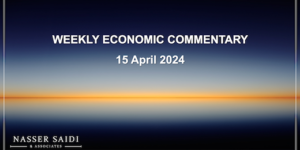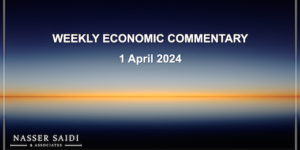Markets
Stock markets started the week sinking along with the intensification of Italy’s fiscal crisis. The first session post-US Labor day was crisis prone, but the decision by the German Constitutional Court to uphold German euro support stemmed some of the worst fears. Clues from Obama’s speech on measures against recession were too vague and uncertain to inject optimism and the resignation of Jürgen Stark from the ECB was another irritant. Regional markets seemed to be little affected by the contagion, with Egypt, Bahrain and Kuwait actually up. The safe haven effect led the dollar to appreciate by 4% against the euro; however oil prices remained stable while the gold prices slid 1.4%.
Global Developments
Americas:
- President Obama introduced the American Jobs Act to finance infrastructure, encourage employers to hire and increase wages. The total amount, less than half a trillion dollars is not seen as changing the US growth path from the current stagnation: see Annex on American Jobs Act.
- ISM non-manufacturing index moved up to 53.3 in Aug (Jul: 52.7), taking the markets by surprise.
- U.S. unemployment claims rose by 2,000 to 414,000 a sign that the labor market is not gaining traction.
- U.S. trade deficit shrunk to a 3-month low USD 44.8 bn from a revised USD 51.6 bn in June as exports climbed to a record and crude oil imports eased. The gap shrank 13.1%, the most since February 2009.
- The Fed Beige Book highlighted that economic activity continued to expand at a modest pace.
Europe:
- ECB left its key interest rate unchanged at 1.5%, pointing to downside risks to economic outlook for the euro area and the high uncertainty in the financial markets.
- German inflation was 2.4% yoy in August, while the trade surplus reached €10.4 bn in July dropping 23.4% yoy.
- German factory orders declined 2.8% mom in July after +1.8% in June, weaker than expected, pointing to sluggish industrial performance ahead. German IP jumped by a walloping 4.0% mom after -1.0% in June. The index has climbed 29% from its low in April 2009 exceeding the pre-crisis peak of February 2008 for the first time.
- The German Constitutional Court ruled that further support to indebted countries does not violate the Constitution, but financial assistance (including issuance of Eurobonds) requires Parliamentary approval.
- Italy’s emergency austerity package was voted in the Senate, but obtained only a grudging nod from the ECB.
Asia and Pacific:
- In China, retail sales increased 17% yoy in August, with inflation at 6.2% yoy, and industrial output rising 13.5%. The trade surplus was $17.8 billion with exports and imports climbing 24.5% and 30.2% respectively.
- Japan’s machinery orders fell unexpectedly by 8.2% mom, the most in 10 months in July (+7.7% in June), as the yen’s postwar record eroded profits and discouraged investments. GDP revision showed a 2.1% yoy contraction.
- In South Korea, GDP expanded 3.4% yoy in 2Q2011, with a 27.1% increase in exports while industrial production rose 3.8%. In light of this development the central bank decided to leave the key rate policy unchanged at 3.25%.
- In Taiwan, the inflation rate was 1.3% yoy in Aug but exports rose only 7.2% yoy, the slowest pace in two years.
Bottom line:
From macroeconomic data, which continue to point to a recession, markets are turning their attention to policy responses for clues. Unfortunately they are not finding much solace there either. Obama’s much awaited speech on a new stimulus is a regurgitation of old ideas and the Republican support is not assured by any means. The G7 Finance Ministers stressed that they will maintain the stability of banks and financial markets and take measure to boost growth. But fault lines emerged between the two sides of the Atlantic with the US pressing the EU authorities to act more forcefully and the Canadian minister doubting that Greece could stay in the euro. Meanwhile the OECD forecast growth across the G7 group of major industrialized economies at 1.6% yoy in Q3 before slowing to just 0.2% in Q4.
Regional Developments
- Bahrain’s telecoms regulator has issued notices to Bahrain Telecommunications Co (Batelco) and Saudi Telecom Co unit Viva, pointing to anti-competitive pricing on international calls to Asia.
- SMN Power Holding, Oman’s largest electricity company, part-owned by Mubadala, plans to raise RO 25 million ($64.9 million) by offering 35% of its shares in an initial public offering (IPO) on the Muscat stock exchange.
- Egypt’s balance of payment deficit reached $9.2 bn in 2010-2011 fiscal year compared to $3.4 bn surplus in previous fiscal year while the current account deficit declined by 35.9% to reach $2.8 bn, the foreign reserves dropped from $36 bn to $25 bn, FDI declined by 67.6% to reach $2.2 bn from $6.8 bn, tourism income dropped by 47.5% to reach $3.6 bn from $6.9 bn, GDP expanded 1.8%.
- Egyptian Finance Minister said the country had received just USD500 million of USD7 billion pledged by the UAE and KSA, though discussions on the remaining funds were ongoing and he expects agreement by the end of the year. This is the first albeit small foreign financing aid for Egypt but it remains promising as a ray of light at the end of a dim tunnel.
- IMF has cautioned Kuwait that its financial sector has the potential of creating a suitable environment for money launderers and terrorist financers and has provided 49 recommendations in a FATF report.
- Kuwait’s inflation rate rose to 4.6% yoy in July, led by surge in food and household goods prices.
- Kuwait’s nominal GDP rose 16.9% yoy in 2010 to KWD 35.6 bn as oil-GDP jumped by 22.5% and non-oil GDP 9.8% after a 23% decline in 2009.
- The foreign ministers of Jordan and Morocco have attended GCC foreign ministerial meeting to discuss the GCC accession in Riyadh last Sunday.
- The GCC Secretariat proposed a flexible timetable for VAT allowing GCC counties to implement VAT individually between 2012 and 2015.
- Qatar increased public and pension wages by 60% at a total estimated cost of QAR 30 bn.
- Algosaibi and Saad, Saudi indebted family groups, have reached initial an agreement under the supervision of a committee including SAMA, CMA and the Royal Court formed by H.H. King Abdullah. The committee concluded that the Saad group is to be blamed and attributed to it the responsibility of Algosaibi group debt as well. This initial agreement will allow banks to start claiming their credits (source: alrroya).
UAE Focus
- HH. Sheikh Mohammed Al-Maktoum inaugurated second metro line, Green line, which runs about 23 kilometers through residential and commercial areas with 16 of the 18 stations operating with a total cost estimated at AED 29.5 bn for the whole metro project.
- HH. Sheikh Maktoum Al-Maktoum, in his capacity as DIFC president, has appointed Saeb Eigner as the new chairman of DFSA and has also renewed the existing DFSA board members for a further three-year term.
- Minister of State for Financial Affairs Obaid Humaid Al Tayer told Dow Jones that UAE is planning to spend an additional Dh110 million on top of its 2011 budget and to pass a new bankruptcy & public debt law before year’s end.
Annex
Fact Sheet on the American Jobs Act
On Sep 8 President Obama unveiled the American Jobs Act which will allow the US economy to create jobs and increase wages. The act comprises five key components:
- Tax Cuts to Help America’s Small Businesses Hire and Grow: the act will cut in half the taxes paid by businesses on first $5 mn in payroll; eliminate payroll tax for businesses that increase payroll by wages or employees with cap at first $50 mn; reduce regulatory requirement and rewarding firms for making investments by allowing them to deduct the full value of those investments from next year tax.
- Putting Workers Back on the Job While Rebuilding and Modernizing America: firms that hire veterans will gain tax credits from $5,600 to $9,600; expanding public school to prevent 280,000 teacher layoffs while keeping cops and firefighters on the job; investing in public infrastructure; increasing internet access and a new “Project Rebuild” which will put people to work rehabilitating homes; businesses and communities; leveraging private capital and scaling land banks and other public-private collaborations.
- Pathways Back to Work for Americans Looking for Jobs: extending unemployment insurance to prevent 5 million Americans looking for work from losing their benefits, A $4,000 tax credit to employers for hiring long-term unemployed workers, prohibiting employers from discriminating against unemployed workers when hiring and expanding job opportunities for low-income youth and adults.
- More Money in the Pockets of Every American Worker and Family: Cutting payroll taxes in half for 160 million workers next year and allowing more Americans to refinance their mortgages at today’s near 4 percent interest rates.
- Fully paid for as part of the President’s Long-Term Deficit Reduction Plan: additional deficit reduction necessary to pay for the Act and still meet its deficit target.
Source: The White House





